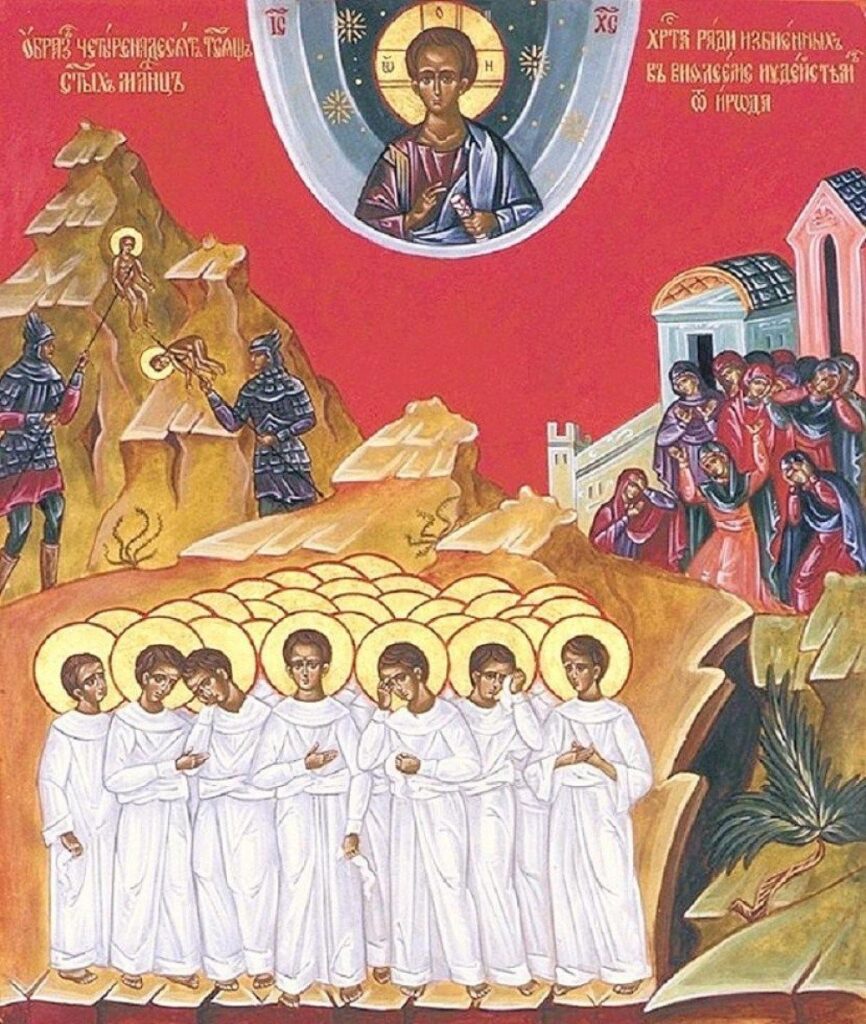In the name of the Father, and of the Son, and of the Holy Spirit, One God, Amen.
Christ is born! Glorify him!
There are some, dear brothers and sisters, who seek justice in this life, and they are scandalised when evil happens to anyone undeservingly. Such people hear today’s Gospel and think, “how can a loving God allow this to happen? How can God allow the innocent to suffer and die?” This view is compassionate and caring—two qualities we want to nurture in our life—but this sees life in this world as the only importance. It is, by analogy, to see the life of an oak tree defined by the acorn, or of a frog defined by the tadpole.

We live, my beloved brethren, in a troubled world, a broken world, a fallen world. A world where fourteen thousand boys under the age of two—some of whose relics are sown into the cloth on our Altar, the antimension, on which our liturgy is offered—were killed on the whim of a mad king, where innocents continue to suffer day-by-day as we see regularly on our news programmes and in the papers.
And into this troubled, broken, fallen world Christ comes. He comes not promising to destroy suffering according to the standards of this world because such standards are false measures—they are corrupted and defect; rather, he comes announcing the tidings of the Kingdom of Heaven where, “God will wipe away every tear from their eyes; there shall be no more death, nor sorrow, nor crying. There shall be no more pain, for the former things have passed away.” (Revelation 21:4)
What then, dear brothers and sisters, are we to do? What is the Christian response? It is to call injustice by its name whenever we see it but not to be scandalised by it because Christ is coming with his righteousness and truth and will settle accounts with all. And to those who have suffered unjustly he will restore, and to those who stand with the suffering he will honour, and to those who serve the suffering he will reward. We know this life is not the end and we act now according to the standards of the next so we train our hearts to be not merely citizens but co-rulers in the Kingdom of God.
To our incarnate, crucified and risen Saviour be all glory, honour and might, together with his unoriginate Father and the All-holy, Good and Life-giving Spirit. Amen.
Brethren, I would have you know that the gospel which was preached by me is not man’s gospel. For I did not receive it from man, nor was I taught it, but it came through a revelation of Jesus Christ. For you have heard of my former life in Judaism, how I persecuted the church of God violently and tried to destroy it; and I advanced in Judaism beyond many of my own age among my people, so extremely zealous was I for the traditions of my fathers. But when he who had set me apart before I was born, and had called me through his grace, was pleased to reveal his Son to me, in order that I might preach him among the Gentiles, I did not confer with flesh and blood, nor did I go up to Jerusalem to those who were apostles before me, but I went away into Arabia; and again I returned to Damascus. Then after three years I went up to Jerusalem to visit Cephas, and remained with him fifteen days. But I saw none of the other apostles except James the Lord’s brother.
— Galatians 1:11–19
When the wise men departed, behold, an angel of the Lord appeared to Joseph in a dream and said, “Rise, take the child and his mother, and flee to Egypt, and remain there till I tell you; for Herod is about to search for the child, to destroy him.” And he rose and took the child and his mother by night, and departed to Egypt, and remained there until the death of Herod. This was to fulfill what the Lord had spoken by the prophet, “Out of Egypt have I called my son. Then Herod, when he saw that he had been tricked by the wise men, was in a furious rage, and he sent and killed all the male children in Bethlehem and in all that region who were two years old or under, according to the time which he had ascertained from the wise men. Then was fulfilled what was spoken by the prophet Jeremiah: “A voice was heard in Ramah, wailing and loud lamentation, Rachel weeping for her children; she refused to be consoled, because they were no more.” But when Herod died, behold, an angel of the Lord appeared in a dream to Joseph in Egypt, saying, “Rise, take the child and his mother, and go to the land of Israel, for those who sought the child’s life are dead.” And he rose and took the child and his mother, and went to the land of Israel. But when he heard that Archelaos reigned over Judea in place of his father Herod, he was afraid to go there, and being warned in a dream he withdrew to the district of Galilee. And he went and dwelt in a city called Nazareth, that what was spoken by the prophets might be fulfilled, “He shall be called a Nazarene.
— Matthew 2:13–23
